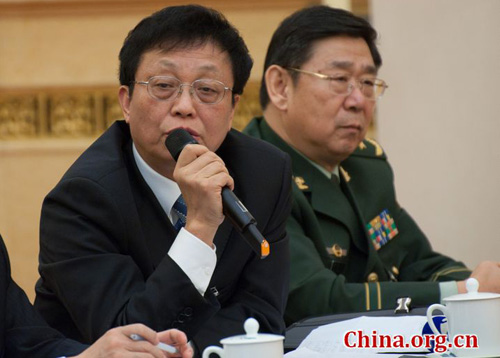Nanjing blames Nagoya mayor for false and painful remarks
- By Chen Boyuan
 0 Comment(s)
0 Comment(s) Print
Print E-mail China.org.cn, March 8, 2012
E-mail China.org.cn, March 8, 2012
Nanjing's municipal authorities have re-emphasized their anger at Nagoya mayor Takashi Kawamura's remark that the "Nanjing Massacre never took place," and will hold him responsible for all bad consequences.
|
|
|
Chen Jiabao, head of the Standing Committee of People's Congress, Nanjing, noted that "Kawamura's irresponsible remarks have greatly hurt the feelings of the invasion-stricken people in Nanjing." [Photo by Chen Boyuan/China.org.cn] |
Chen Jiabao, director of the Standing Committee of Nanjing Municipal People's Congress, the local legislature and also the province's delegate to the 11th National People's Congress (NPC), noted that "Kawamura's irresponsible remarks have greatly hurt the feelings of the invasion-stricken people in Nanjing."
"This is very distressing. Kawamura shall be held fully accountable for the worsened situation," Chen said.
Chen added that Nanjing and Nagoya's inter-city rapport goes back as far as 1978, and is the first example of such ties between China and Japan after the two countries normalized their diplomatic relationship in 1972.
"Contact between the two cities has been very active over the past three decades, especially in the fields of economy, culture, sports and urban planning," said Chen.
Kawamura made the remark on February 20 when meeting with a visiting Nanjing delegation.
In less than 24 hours, Nanjing's local government made a formal protest via its official microblogging account, in which Nanjing has reiterated its firm stance on the historical issue and decided to suspend all official communication between the two cities.
China's Ministry of Foreign Affairs (MFA) has also backed up the reaction coming from Nanjing. On February 22, the Ministry's spokesperson Hong Lei said the Chinese government had issued a serious protest to the Japanese side, and expressed understanding as well as support for Nanjing's decision. The MFA hopes Japan can now follow the basic principles in boosting a healthy development of Sino-Japanese ties.
On Tuesday, Japanese Consul General to Hong Kong, Yuji Kumamaru was quoted by Hong Kong Ming Pao Daily News as saying "such remarks were isolated ones and do not represent the stance of the Japanese government."
The Japanese Consul General said that the Japanese government had felt "deep remorse" over what happened during the war and would once again apologize to Chinese people, according to Ming Pao Daily News. The Japanese daily Mainichi Shimbun reported that the Chinese Embassy in Japan on Monday denied the visit request by Kawamura, who had earlier refused to withdraw the remark. It's reported that Kawamura had wished to restore official relations with Nanjing by visiting the Chinese Embassy.
Amid all the waves of protest from Nanjing and possibly from beyond the Jiangsu Provincial capital city, Chen Jiabao has expressed his sincerity in restoring the relationship between the two cities.
"We greatly cherish the bilateral ties, and we would wish to promote a healthier and more stable relationship; this is the basic stance that we have never altered," said Chen.
"The suspended communication doesn't apply to those Japanese nationals who respect history, even including those in Nagoya. Nanjing hopes certain people in Japan can respectfully deal with that part of history for the greater good of the two cities and their people."







Go to Forum >>0 Comment(s)